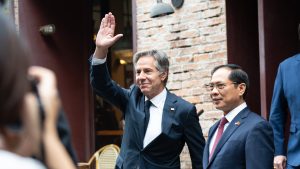When rumors started to emerge about the possible elevation of Vietnam-U.S. diplomatic framework to a “comprehensive strategic partnership,” which eventuated during U.S. President Joe Biden’s visit to Vietnam this weekend, many alluded that this is driven primarily by Vietnam’s need to counterbalance China’s growing influence, especially its naval expansionism in the South China Sea.
This is flat out wrong.
Since the end of the Cold War, Vietnam’s foreign policy has been that of independence, self-reliance, diversification, and multilateralization. This doctrine has been consistently implemented and contributed immensely to the improved international standing and success of the country. Therefore, there is no reason the country should depart from these time-tested principles.
Second, Vietnam had learnt a hard lesson that aligning with a superpower to counterbalance another is not an optimal way to protect its interests. Vietnam’s alignment with the Soviet Union during the Cold War, for example, was not sufficient to protect Vietnam’s islets and sand banks in the Spratly Islands from being occupied by China in 1988. Vietnam’s independent and self-reliant foreign policy, therefore, is as much a reminder for itself as a proclamation to the world.
Third, whereas many Western analysts see “strategic partnership” as a defense- and security-laden term, Vietnam does not. In Vietnam’s diplomatic vocabulary, a strategic or comprehensive strategic partner is one with which it has an all-round, substantive, trusting, and long-term relationship. Defense and security ties need not be the core nor the most substantive part of such a relationship. Singapore, Malaysia, New Zealand, and Spain are some examples of Vietnam’s strategic partnerships where defense and security cooperation are not the main thrust of the relationship.
After all, there is little that Vietnam would not be able to do, should it really seek to collaborate with the U.S. to counterbalance China, under the existing “comprehensive partnership” framework. To point to China as the cause of the elevation of the framework is an over-assumption.
Then why is Vietnam upgrading ties with the U.S.? It should be noted that in Vietnam’s omnidirectional foreign policy, despite the significant, fast growing and comprehensive relationship, the U.S. is the only permanent member of the U.N. Security Council with which Vietnam did not yet have a “strategic partnership.”
Compared to the rest of Southeast Asia, Vietnam has had a rather difficult and slow start to its relationship with the U.S., and in many aspects, Vietnam still trails its Southeast Asia’s counterparts in its ties with the superpower. As shown in this document compiled by the U.S.-ASEAN Business Council, the number of U.S. companies operating in Vietnam, for example, is just a quarter or at most a half of those already active in the original member states of the Association of Southeast Asian Nations (ASEAN). The number of military engagements between Vietnam and the U.S. is, on average, just a third of the number of several Southeast Asia peers, and is only on par with that of Cambodia and Brunei.
As the world’s top economic power, relations with the U.S. are central to Vietnam’s development strategy. A lower middle-income country, Vietnam aspires to be a fast-growing economy to reach the level of a higher middle-income country by 2030 and a high-income country by 2045. For Vietnam, the economy is also a form of security. “A strong economy, an open foreign policy, and capable enough military” is Vietnam’s philosophy for security. Vietnam sees the U.S. as an indispensable partner in its quests for both development, open foreign policy, and security.
The U.S. is not only one of the largest trading partners of Vietnam; partnering with the U.S. is also critical to attract the high-quality investment and technology Vietnam must possess to break through the foreseeable middle-income trap. Acquiring critical technical capability through education is another of Vietnam’s objectives. Already, the U.S. is the largest destination for Vietnamese students studying abroad, with some 25,000 studying at American universities, the fifth-largest foreign student cohort in the country.
As a former foe and superpower with a different political system, a good relationship with the U.S. is also key for Vietnam’s integration into an international system where the U.S. is still in many ways a key player.
Washington’s broad vision of an international system based on international law, where the basic principles of the U.N. Charter are to be respected, aligns with the ASEAN Outlook for the Indo-Pacific (AOIP). Hanoi, therefore, does not oppose the U.S.’ roles in the Indo-Pacific, so long that the U.S. keeps those roles consistent with the AOIP and within the framework of international law.
The upgrade of ties with the U.S. is also in line with Hanoi’s anticipation of a multi-polar global configuration, where Vietnam would seek to stabilize and deepen its relationship with all those “poles.” Just within the last few months, Vietnam has announced the upgrade of its relationship with South Korea, Australia, and Singapore. The U.S. is not the first, and will not be the last, of the string of elevations of Vietnam’s diplomatic partnerships.
Lastly, as the U.S.-ASEAN relationship was upgraded to comprehensive strategic partnership in 2022 in Phnom Penh, the promotion of a component bilateral relationship to the same level seems to make perfect sense, both in terms of substance and in terms of timing.
In conclusion, Vietnam’s ultimate purpose for the upgrade of diplomatic ties with partners across the board, including with the U.S., is to stiffen its network of relationships, and to enhance its resilience and strength in a world of growing uncertainty. That need for resilience is not in response to any particular threat, any particular source, or any particular country.

































